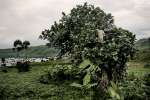Pining Central African boy dies before family reunion possible
News Stories, 17 February 2015
BANGUI, Central African Republic, February 17 (UNHCR) – The pain of separation proved too much for one young boy from Central African Republic, who died last week of severe manutrition, desperate to escape a virtual prison and reunite with his parents.
Youssoufa was one of the latest victims of the bitter inter-communal violence and terror that has plagued his homeland since March 2013, when predominantly Muslim anti-government Seleka forces took power in Bangui and indulged in gross rights abuses, triggering a bloody response by Christian-linked anti-Balaka militia groups.
The extreme violence has caused massive population displacement, with tens of thousands of people forced to flee their homes and find safety within Central Africa Republic or in neighbouring countries. Many children have been separated from their families during the trauma and chaos of flight, including Youssoufa and his two sisters, Ramatou and Awaou.
The UN refugee agency regards unaccompanied minors and separated children as particularly vulnerable and tries to trace parents or other relatives. It is working closely with asylum countries and the Central African Republic authorities to reunify children and family members.
It is too late for Youssoufa, but UNHCR hopes that his sisters and other separated children in the Yaloke enclave – where they have been trapped for months – will be reunited with families in Chad and Cameroon.
The boy's ordeal began in February last year, when his family and others fled attacks by armed groups on the mainly Muslim and nomadic Peuhl, or Fulani, people in Lobaye prefecture, west of the capital of Bangui.
They walked for months, hiding in the bush, running for their lives, desperately searching for a safe haven. But disaster struck when the family tried to board a truck heading towards Cameroon. In the desperate scramble, Youssoufa's parents were able to escape but the boy, his two sisters and their grandfather were left behind.
The four of them, after escaping attacks, found refuge in a small town called Yaloke, located about 200 kilometres north-west of Bangui. But their new home effectively became a prison, with some 400 Peuhls living in a 500-metre perimeter protected by troops. It was a shock for this proud, nomadic people, who found themselves unable to provide for themselves and in need of urgent humanitarian assistance.
As the conditions deteriorated, Youssoufa became more depressed and desperate. He had not seen his parents for more than eight months; he had witnessed all sorts of horrors during his flight. He was also suffering from severe malnutrition and lost his ability and desire to eat, despite encouragement from aid workers. He died on Tuesday last week
All were touched by this young boy and his love for his family, and saddened as he began to waste away. Two weeks ago, UNHCR finally managed to track down his parents in Gado, eastern Cameroon.
They were delighted to hear that the three children were alive, but worried about their situation. They were waiting for that special moment when they would be reunited. Then came the devastating news that their homesick son had died.
"The news of the death of Youssoufa was a shock to all of us," said Kouassi Etien, UNHCR's representative in Central African Republic. "We are working hard to identify the locations of other separated family members of IDPs [internally displaced people] trapped in Yaloke in order to facilitate their reunion before it is too late."
As it mourns his death, UNHCR hopes to reunite Youssoufa's siblings with their parents. It has also identified another 14 separated children in the Yaloke enclave as well as 23 individuals wishing to be reunited with their families in Cameroon or Chad.
UNHCR also continues to advocate for the respect by all sides of freedom of movement for those at risk, a basic human right. More than 90 per cent of the Peuhls in Yaloke have told aid groups that they wish to be evacuated on humanitarian grounds.
By Dalia Al Achi in Yaloke, Central African Republic

















































